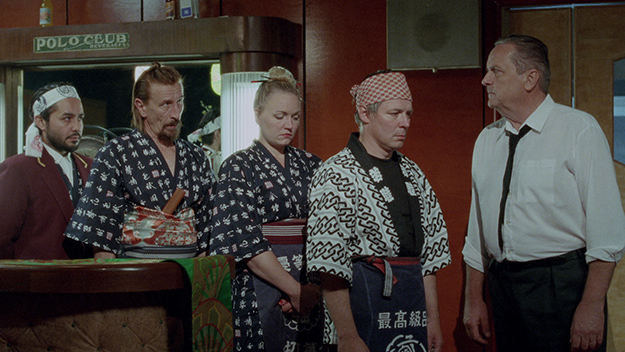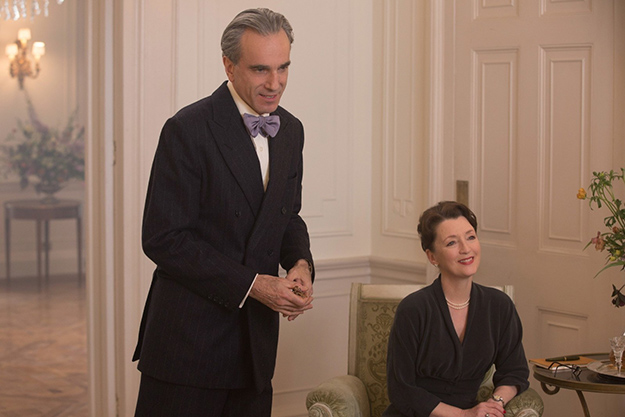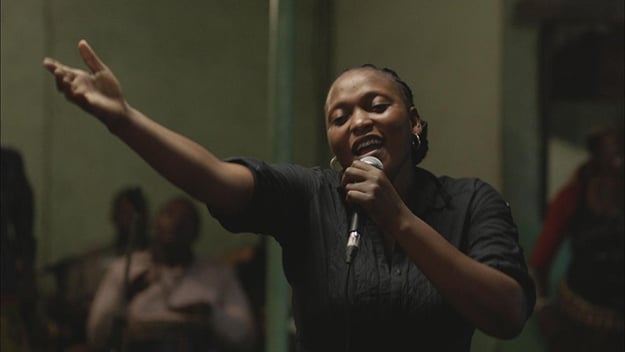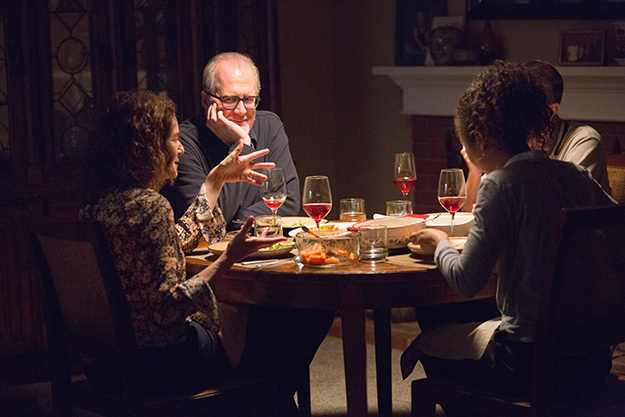Making the Case (Continued)

The Other Side of Hope (ranked #12)
With The Other Side of Hope, Aki Kaurismäki expands on Le Havre’s consideration of the migrant crisis by frankly rendering xenophobic violence against a backdrop of person-to-person generosity. When frustrated shirt salesman Wikström (Kaurismäki regular Sakari Kuosmanen) first swerves his vintage car past Syrian refugee Khaled (Sherwan Haji, folding depths of emotion into Keaton-style deadpan), it’s a fleeting introduction that ties their fates together through low-key coincidence—a force that eventually reunites them, once the former’s quest to open a restaurant coalesces with the latter’s path through applying for asylum. This makes for a dry serving of screwball antics at Wikström’s newly-styled sushi place, but the Kaurismäkian warmth breaks down beyond its walls, where Khaled is routinely harassed by a gang of nationalist thugs. Though Timo Salminen’s 35mm cinematography suits the tactile romanticism of jukeboxes and cigarette smoke, it doesn’t create a hermetic universe of pacifying nostalgia; deep colors dissolve into the melancholy chiaroscuro and dull grays of a decidedly present-day Helsinki. As Kaurismäki peppers the film with performances from his favorite Finnish blues musicians, he externalizes anguish without laying it on thick—time and again, his empathetic minimalism keeps his tonal preferences from calcifying into a rigidity of vision.—Chloe Lizotte

The Florida Project (ranked #14)
Borrowing its title from Disney World’s planning-stage moniker and not the focal motel which resembles a kitschy housing project on the outskirts of the Magic Kingdom, Sean Baker’s The Florida Project is aptly named for another reason: with its largely non-pro, local, and grade school–age cast, it invariably feels like a documentary on its own making. Two years after his iPhone-shot Tangerine wed the impassioned humanism of Loach to the grassroots commitment of early De Sica, Baker offers another sensitive study of near-destitution adjacent to wanton indulgence, refusing to beatify or condemn his survivors-at-any-cost (single mom Halley, played by Instagram discovery Bria Vinaite, is reckless and belligerent but scarcely more than a child herself). The kids, led by six-year-old Moonee (the arrestingly but never studiedly precocious Brooklynn Prince), regard the motel as the fairy-tale castle it garishly pretends to be, scampering about like Eloise in a down-market Plaza under the watchful eye of beleaguered manager Bobby (Willem Dafoe, radiating exhausted compassion). Like last year’s American Honey, Baker’s film is a timely paradox—call it magical neorealism—depicting hardscrabble poverty without the attendant sermonizing. In both of these melancholy summertime gambols, imagination can make adventure out of just getting by.—Steven Mears

Phantom Thread (ranked #16)
Going into Phantom Thread, all I knew were stray keywords—English, dressmaker, 1950s, Balenciaga—that didn’t connect with anything I associated with Paul Thomas Anderson. As the film unfolded, I kept asking myself, What is he doing and where is he going? Was this his Age of Innocence or Gosford Park, those period pieces whereby his postmodern mentors showed they could go toe to toe with James Ivory and maybe go one better? Or was it a companion piece to Darren Aronofsky’s mother!, another 2017 portrait of the artist as an abuser of muses and an all-purpose asshole? Then a quaint touch of arsenic and old lace crept in and I wondered if we were entering Agatha Christie territory. Actually, Phantom Thread encompasses all of the above, but it was at this point that I got the charming jeu d’esprit tucked into the yards and yards of fabric: When a domineering, workaholic tyrant of an artist is felled by illness, he becomes a whimpering boy who needs his wife’s love and affection. With this epiphany, the power balance shifts, slyly and none too soon. As Reynolds Woodcock, Daniel Day-Lewis tests the limits of abrasiveness within a narrow emotional range; he shares that compulsion to produce discomfort with Joaquin Phoenix, Adam Sandler, and other Paul Thomas Anderson leading men. There’s a lot of humor when he grits his teeth at his lady love Alma (Vicky Krieps) buttering toast and pouring tea, sounds that grow unexpectedly indelicate and deafening to his sensitive ears. Lesley Manville is terrific as Woodcock’s all-knowing sister Cyril, a kindred spirit to Mrs. Danvers. And Krieps emerges as the perfect figure for Woodcock’s purposes (and designs)—embodying the freshness of youth, while stolid enough to withstand his frenzies. Anderson’s stately and stilted treatment of the fashion world made me miss the visceral American subcultures of his early work: the virtuoso tracking shots of Boogie Nights, or the layered vignettes of Magnolia, with characters howling into the night. But intriguingly, and for the first time in his career, the woman becomes the real protagonist, as Alma learns to induce those depressive states that turn her husband into a human being. Their story isn’t one of redemption, but a salvage operation, whereby the slightly less neurotic person tosses a lifeline to the one who is going under—in other words, a love story, Anderson-style.—Molly Haskell

Félicité (ranked #27)
When director Alain Gomis introduces us to single mother and nightclub singer Félicité, he seems to hold onto realism with as firm a grip as his fierce heroine. Félicité travels from door to door seeking money for an operation desperately needed by her son, and Gomis pragmatically depicts the challenges of failing infrastructure and petty scheming that she faces. But as Félicité’s life spirals out of her control, Gomis lets his style evolve with her. Félicité is pushed to reexamine the life she has spent in self-imposed solitude, and the more she abandons her defenses, the more Gomis seamlessly weaves expressive worlds of music and myth into the fabric of her everyday existence. The film imaginatively engages with realism, conceptualizing the spiritual dimensions that make it possible for an individual to change themselves and their circumstances. With music from Kasai Allstars and the Kinshasa Symphony Orchestra, and a ferocious lead performance from actress Véro Tshanda Beya Mputu, Félicité is a triumph of post-colonial imagination. No film in 2017 was more committed to expanding the logic and limits of freedom.—Teo Bugbee

The Lovers
Wife and husband Debra Winger and Tracy Letts are both having affairs when they abruptly—kind of magically—re-discover lust and joy for each other. So they begin cheating on their paramours. This might have been a sitcom setup, but writer-director Azazel Jacobs finds wonderful play between the generic (featureless homes and workplaces) and the specific (the speaking voice used on a cellphone in a car, the sound of wind chimes outside your girlfriend’s house). Even allowing for (and partly because of) the sometimes uncertain chemistry between the different acting styles of the leads, the film is genuinely mysterious. In an offhand way that summons the ghost of Jean Renoir, The Lovers embraces the wayward, messed-up humanness of its characters—an acceptance that extends, deliciously, through the supposed end of the story—and opts not to scold or punish. In that, it couldn’t be more out of touch with our times.—Robert Horton







